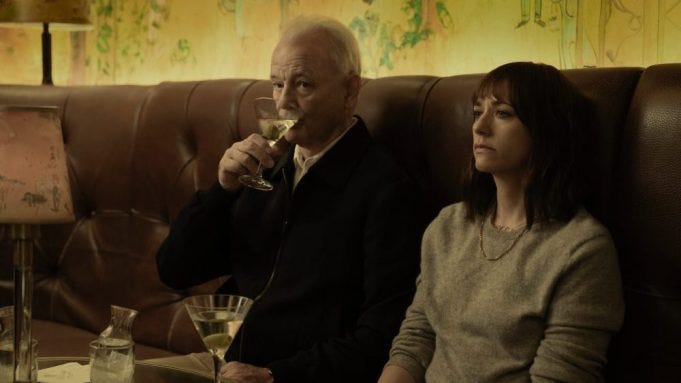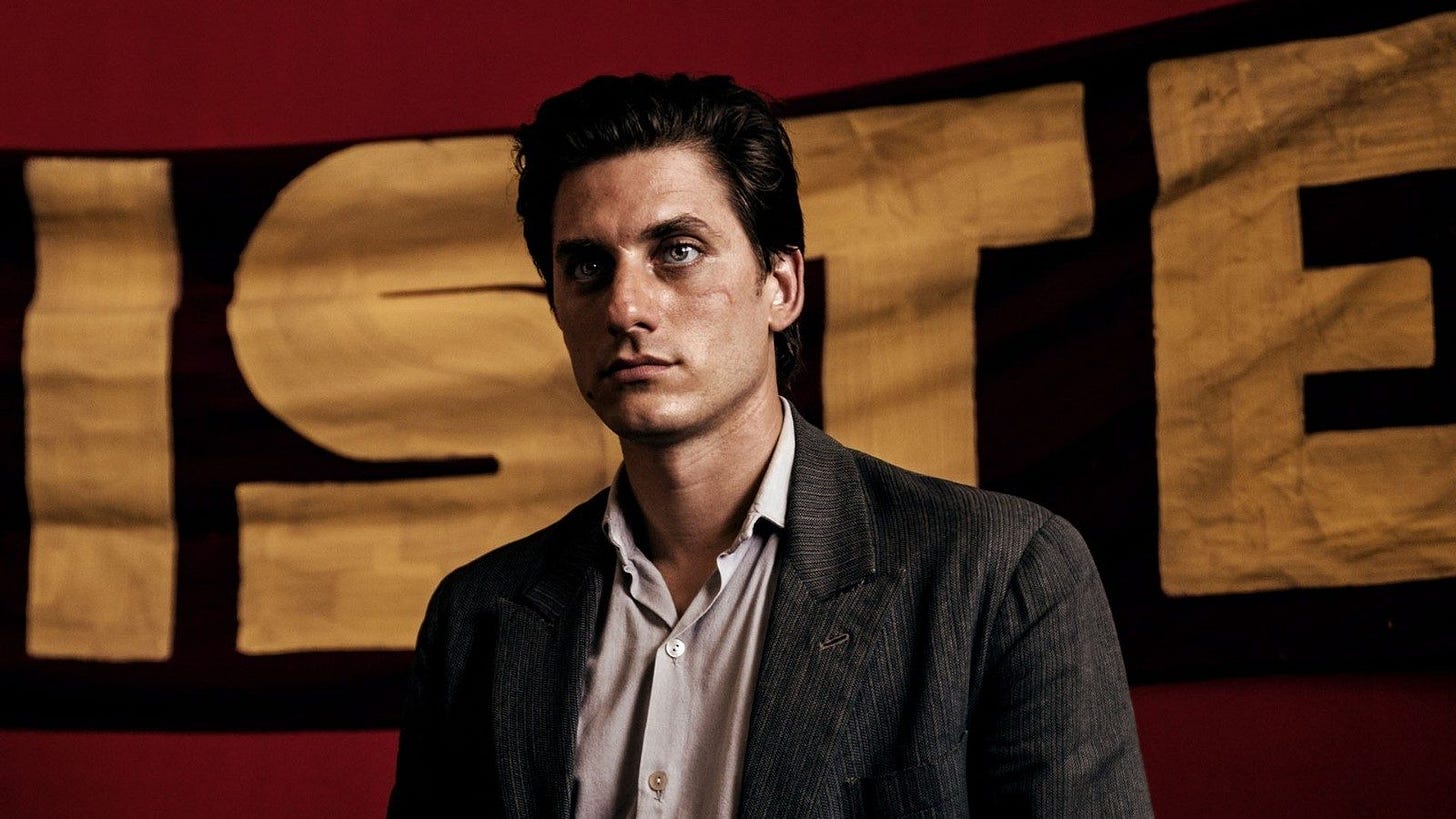
LETTER OF INTRODUCTION
This week, I tried something different on the podcast. After talking about some recent movies, I dug into a special topic with another guest. So, on the first half, I trade New York Film Festival highlights with critics Beatrice Loayza and Susannah Gruder. Then, I talk about the possible futures facing moviegoing and film exhibition because of the pandemic, with critic/curator Eric Hynes of the Museum of the Moving Image.
The Last Thing I Saw will feature more in-depth discussions like that—spotlights on an individual film or filmmaker, interviews, and other stories. That’s in addition to the usual chats about new and noteworthy movies. I’m blithely calling this work in progress an audio magazine, and I hope you enjoy the evolving results.
Finally, I am happy to present to you, my adoring substackers, my interview with the director of Martin Eden—an excellent Italian drama which opens this weekend. Pietro Marcello adapts a stimulating lesser-known novel by Jack London, casting a likely future heartthrob in Luca Marinelli.
Too much for one dispatch? Perhaps, but let’s live a little! And if you like what you read or hear, or simply want to generally support the abstract idea of me, please share the substack with others. As always, I can be reached at:
nicolas.rapold@gmail.com
PODCAST SHOW NOTES
Episode 17: New Beginnings, with Beatrice Loayza, Susannah Gruder, and Eric Hynes
New York Film Festival highlights and personal viewing, with Beatrice Loayza and Susannah Gruder
Eric Hynes on a possible better tomorrow for the beleaguered film industry

Movies discussed (with some links to watch or buy)
Beginning (dir. Dea Kulumbegashvili)
Smooth Talk starring Laura Dern (coming soon online)

Movies referenced
Jeanne Dielman, 23, quai du Commerce, 1080 Bruxelles
Groundhog Day
Broken Flowers
Somewhere
The Virgin Suicides

Knife + Heart
Delphine and Carole (trailer)
Readings:
“Where Are You Going, Where Have You Been?” original story by Joyce Carol Oates, adapted for Smooth Talk
“The Daemon Lover” by Shirley Jackson
THIS CRITIC’S PICKS
The best last things I saw. New or new-ish, via streaming and/or DVD.
American Utopia [HBO]
Time [Amazon]
Cat People (1942) [Criterion]
They Were Expendable (1945) [HBO MAX]
Bamako (2006) [OVID]

Chisholm ‘72: Unbought & Unbossed [OVID]
NEW FROM THE VAULT
An interview with Pietro Marcello, director of Martin Eden (learn where to watch here)
Pietro Marcello’s Martin Eden adapts Jack London’s 1909 novel about a sailor who becomes a celebrated writer, but whose success leads to his downfall. Luca Marinelli plays Martin Eden with a winning swagger; the actor has since popped up in the action adventure The Old Guard, and will likely be seen more. Marcello’s last feature was Lost and Beautiful, and his elegant, haunting use of archival footage here builds upon his short films. Martin Eden had its world premiere in the Venice International Film Festival last year and also played in the Toronto and New York festivals. Here is my interview.

When did you first read the Jack London novel?
The novel was a gift given to me by Maurizio Braucci, who is the co-writer of the screenplay. He gave it to me when I was 20. He said: “Read it. You’re going to like it.” And after 20 years, we made the film.
What struck you about the book?
It's a book about a self-taught man, and being myself self-taught, an autodidact, it was very important in that respect. And it’s a book that interests all self-made persons, those who decide to emancipate themselves, to improve, and to evolve through culture.
What were your priorities in adapting the book? Part of what’s distinct is how you deal with time and the setting, but also you work with different film stocks.
First of all, we decided to make an Italian adaptation. It would have been ridiculous to keep the Anglo-Saxon form, considering both cast and crew would have been Italian. It would not have been believable. But we do believe that Martin Eden is an archetype, and therefore it’s a coming-of-age story about this boy that enters adulthood by redeeming himself through culture, although he becomes the victim of the cultural industry.
We [in Italy] do not have the tradition of sort of maritime literature. We don’t have the oceans—neither the Pacific nor the Atlantic. We don’t have Melville, Conrad, Stevenson, London. We have different kinds of writers. And the sea has always brought problems to us Italians in a way. The Mediterranean Sea, the Mare Nostrum, is like a big bathtub that has brought problems to all the countries.
With the archival material, that’s an evolution of my work basically. And I’ve always worked with film stock. I love film stock. I always shoot on film, although nobody else does nowadays, and I also have a camera obscura where I develop film. I like the alchemy of it.
And the silent film footage that’s hand-tinted?
We made this. A custom work, like we used to do in filmmaking.
Martin Eden had its world premiere in Venice. In the Venice Classics section, there was a screening of a Soviet film—
Kalina krasnaya?
Yes!
One of my favorite films. It’s not well shot, but it’s a film that is made with soul and with heart. I saw that film in a cinema. And [director] Vasily Shukshin did everything, you know. He was also the lead actor. We don’t have another one like it.
I thought of that film in connection with Martin Eden a little since it’s also about a defiant thinker. Tell me about casting Luca Marinelli in your film.
When I read the book, and re-read it, I thought of the physicality of Burt Lancaster, you know, his body. But our Martin Eden is much more modern, and also in a film we wanted to have a portrait of history with a capital H, and go through what’s happened in the 20th century through archival material. And I immediately thought of Luca Marinelli to play the role.
Yes, it’s a history of thought in a way. Could you talk a bit about how you’re using Herbert Spencer?
Yes, after Herbert Spencer there were Nietzsche, Mussolini, Hitler, and Stalin, and Jack London was an expert on Spencer. [Spencer] came about soon after Darwin, and he also wrote horrible things. And Jack London was somehow a follower of him. And in the book as well, Martin starts following his theories.
It sounds a little bit like Ezra Pound supporting Fascism.
Yeah, Ezra was a poet, and Spencer was no poet. So you can forgive poets, because they’re poets! But not thinkers.
Martin Eden is a very independent thinker and he goes down a bit of a dark road, getting interested in Herbert Spencer [typically associated with a “survival of the fittest” ethos].
But Martin Eden is a negative hero, not a positive one, which is the second part. Because when he gets to success, he loses touch with reality, and he gets completely lost. No one loves him anymore, because he loses touch with reality. In the first part, we love him because he wants to improve himself. He challenges himself. It’s difficult to accept, as Jack London had a hard time getting accepted when he wrote Martin Eden. He got lots of letters complaining about the novel and the ending of the novel, of Martin Eden himself, to which he replied: “Each of us has his own Martin Eden.” And it’s a very autobiographical novel to him because probably he was the first victim of the cultural industry in terms of the publishing industry.
Do you think the dangers posed by the cultural industry persist?
Yeah, we are totally subjects, and subjugated. We are enslaved by it. It’s something that comes naturally: we don’t even question it. We agree, and we go along with it. Guy Debord in 1975 wrote against it, against the culture of narcissism, of these kind of attitudes. And Christopher Lasch wrote another book, The Culture of Narcissism.
The film seems to fit into a strand in Italian film about intellectuals facing a reckoning. Do you feel like you’re in dialogue with that too?
I always think about the way Proust talked about himself, and the way that he talked about the others and observed others—there’s a will to be together. But I don’t think that I can belong to—I don’t think there is a lineage of intellectuals, because we are all very lonely and separated. There’s no social pool. We have neorealism in Italian cinema because there had been the Second World War, and many filmmakers found themselves with the need of saying things all together. Now, everything is separated. We no longer have cinema as a political weapon as we used to back then.
Pasolini felt like one central postwar intellectual in film and otherwise...
Vasily Shukshin [director of Kalina krasnaya] used to be called the “Russian Pasolini.”
Spencer probably has supporters today.
We are witnessing the cycle and recycle of history. We’re talking about populism and sovereignism, and who would have thought 30 years ago that fascism would be back in fashion, and individualism [like this]. That’s why Martin Eden is a very topical film.
Absolutely. And your portrayal of the bourgeoisie is intriguing. The daughter character outwardly seems cultured and enlightened, but she has a traditional prescription for Martin Eden to follow.
Conservative, yes.
Are you working on a new feature after this?
Nothing so far, because I need to have an urge. I need to have something that I believe is worth telling—to feel the need for it.
—Nicolas Rapold
THE END
Here I might wrap up with a song.


